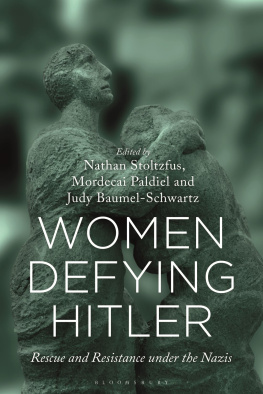Praise for
Women of Valor: Polish Resisters to the Third Reich
It is worthy of note that each of the remarkable women in Joanne Gilberts, Women of Valor: Polish Resisters to the Third Reich, made a point of showing that her survival often depended on the actions of Gentilesactions that too often tragically resulted in the Gentiles executions. It took courage to live through these events. It took courage, compassion, and skill to listen to these stories, and to capture them. The journey that you will share in this book is well worth the efforts of the writer, the survivor, and the reader...
Professor Michael Berenbaum, PhD., rabbi, author, film maker, professor: American Jewish University
I enjoyed reading the too-long-unsung stories of women who defied the Nazis in Joanne Gilberts book, Women of Valor: Polish Resisters to the Third Reich. Manya Auster Feldman has been one of my heroes ever since I was honored to meet her many years ago. That Gilbert has so sensitively and effectively captured the voice and spirit of each of these extraordinary women is an achievement worthy of praise.
Charles Silow, PhD., clinical psychologist, director of the Jewish Senior Life of Metropolitan Detroits Program for Holocaust Survivors and Families
To call them Women of Valor perfectly describes what they did: they stood up to the greatest evil we saw in the 20th century and maybe any century. Joanne Gilbert has told us a story that is little known and incredibly inspiring, and she has told it with love, verve, insight, and thorough research.
Dr. Michael Green, PhD., author, history professor: University of Nevada/Las Vegas
Women of Valor: Polish Resisters to the Third Reich
Copyright 2014 by Joanne D. Gilbert, M.Ed
All rights reserved. Published in the United States of America.
No part of this book may be used or reproduced in any manner
either in print or electronically, including information storage and retrieval systems,
without the written permission of the publisher, except by a reviewer
who may quote brief passages in a review. Requests for permission
can be made in writing to:
GIHON RIVER PRESS
P.O. Box 88
East Stroudsburg PA 18301
www.gihonriverpress.com
Publishers Cataloging-In-Publication Data
(Prepared by The Donohue Group, Inc.)
Gilbert, Joanne D.
Women of valor. Polish resisters to the Third Reich /
Joanne D. Gilbert, M.Ed.First Gihon River Press edition.
pages ; cm
Includes bibliographical references.
ISBN: 978-0-9819906-4-4 (paperback)
ISBN: 978-0-9890841-3-0 (eBook)
1. World War, 19391945Underground movementsPolandBiography.
2. World War, 1939-1945WomenPolandBiography. 3. World War, 19391945Participation, Female. 4. Anti-Nazi movementPolandBiography.
5. WomenPolandHistory20th century. 6. PolandHistoryOccupation, 19391945. I. Title. II. Title: Polish resisters to the Third Reich
D802.P65 G55 2014 943.8/053/0922
First Gihon River Press Edition
Dedicated with love and admiration to my grandmother,
MICHELEH (MILLIE) WINEMAN RON
(1885, Vilna, Lithuania1989, Southfield, Michigan)
and to my granddaughter,
JULIA GRACE ZAMBRANO GILBERT
(2004, Las Vegas, Nevada)
Women of Valor... Past and Future
A Woman of Valor...
is robed in Strength and Dignity
and faces the Future with Grace
PROVERBS: 31
Contents
Foreword
T here is a scene in the final film of the Permanent Exhibition of the United States Holocaust Memorial Museum in which a plump, elderly Jewish woman, speaking with a heavy Yiddish accent, counts one... two... three, while slowly holding up her fingers, one at a time. It takes the viewer a couple of seconds to grasp the meaning of her words as she recounts her perilous escapades as a resistance fighter in the Sobibor Death Camp uprising in October1943. It is hard for the viewer to reconcile the image of this gentle, kindly grandmother with the stark story of her actions during the deadly revolt against the Germans. It is difficult to envision her daringand successfulescape from a death camp where some 250,000 Jews had been murdered. And as she lifts each finger, it is especially daunting to envision her decision to exact a price on her oppressors: taking the lives of three SS officials.
I kept thinking of this image as I read Joanne Gilberts four stories of Jewish women who resisted the Germans. When you look at the images of them today as 8090 year-old grandmothers: a retired Hebrew School teacher, a renowned photographer, a research-scientist, and a pious, thrice-widowed Brooklyn fine-artist, you could never imagine the dramatic stories behind their survival. Had these stories not been told with care and respect for accuracy, the reader might imagine that they were the stuff of fable, and not the lot of four young girls who had been thrown into a world of death and destruction. And while they had had no choice about their newly brutal circumstances, their choice to resist oppression, despite their lack of personal power, provides us with necessary, important, and inspiring lessons.
Just because Jews were powerless
does not mean that they were passive.
This sage observation of David Marwell, a Holocaust historian and director of New Yorks Museum of Jewish Heritage, epitomizes the widely unknown actions of anti-Nazi resisters. For many years the image of the Jews was of pure passivity in the face of destruction. Others who were not there were often embarrassed by that perceived passivity, ashamed of the survivors, and perplexed that they did not fight back. Over time, we have come to understand the varieties of Jewish actions and also to appreciate the difficultif not choicelesschoices that the victims faced. I teach my students at the American Jewish University that premature judgments are most often immature judgments with little appreciation for how dire the circumstances.
The women you will read about in Gilberts book showed time and again, even before they became resistance fighters, that despite their lack of power, they refused to be passive. And they exhibited a variety of resistance actions. They were willing to give up all that they knew, including their own identities, to move from town to town, from situation to situation, and from the unknown to the unimaginable. That these young women defied the odds and survived is a tribute to their ability to maintain their humanity despite the overpowering forces that were determined to destroy them. These four young women were essentially powerlessbut they refused to be passive. They could not have known at the time that their thoughts and actions occurred within specific, identifiable, stages of human resistance to oppression.
Swiss historian Werner Rings (1910-1998) identified four stages of resistance practiced in every country under German occupation: Symbolic Resistance, Polemical Resistance, Self-Help and in the endbut only in the endArmed Resistance. Symbolic Resistance included those efforts to deny the enemy their goal. For Jews, it often consisted of spiritual defiance, secretly maintaining religious practices and cultural traditions. Another example was their determination to remain humane, giving to one another under conditions that pushed individuals toward their limits and threatened to turn one against the other in the lonely battle for survival. Symbolic Resistance could be even more basic, like the inmate who washed his clothes in filthy water and put them on wet to remind him that he once wore clean clothes each morning. And Primo Levi, perhaps the most keen observer of human nature in the camps, wrote of his friend Lorenzo, But Lorenzo was a man. His humanity was pure and uncontaminated; he was outside this world of negation. Thanks to Lorenzo, I managed not to forget that I myself was a man.
Next page










